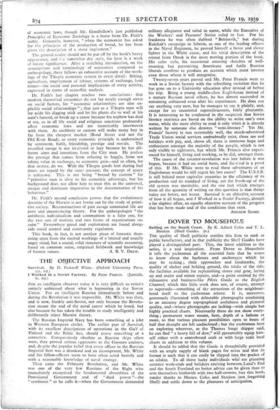THE OBJECTIVE APPROACH
FOR an intelligent observer today it is Very difficult to remain entirely unbiassed about what is happening in the Soviet Union. For an intelligent Russian immediately before and during the Revolution it was impossible. Mr. White was then,
and is now, frankly anti-Soviet, nor only because the Revolu- tion meant the end of the naval career which he loved, but also because he has taken the trouble to study intelligently and deliberately reject Marxist theory.
The Russian Imperial Navy has been something of a joke in Western European circles. The earlier part of Survival, with its excellent descriptions of operations in the Gulf of Finland and the Baltic Sea, should prove something of a corrective. Comparatively obsolete as Russian ships often were, they proved serious opponents to the German cruisers, and, despite the popular belief that every officer in the Russian Imperial fleet was a drunkard and an incompetent, Mr. White and his fellow-officers seem to have often acted bravely and with a reasonable knowledge of naval strategy.
Then came the February Revolution, and Mr. White was one of the very: few Russians of the Right who immediately recognised the fundamental absurdities of the Provisional Government and of "dual power "—the " symbiosis " as he calls it—when the Government demanded military allegiance and ruled in name, while the Executive of the Workers' and Peasants' Soviet ruled in fact. For his frankness he was often dubbed "Bolshevik," but during Kolchak's campaign in Siberia, as one of the leading officers in the Naval Regiment, he proved himself a fierce and clever fighter in the White cause, and his vivid description of the retreat from Omsk is the most moving portion of the book. His calm style, his occasional amusing sketches of well- meaning but patronising Americans and futile Russian liberals combine to produce an account which must interest even those whom it will antagonise.
Twenty-seven. years passed and Mr. Peter Francis went to work in a Soviet factory with the refreshing variation that he has gone on to a University education after instead of before his trip. Being a young middle-class Englishman instead of a mature Russian naval officer, he has almost succeeded in remaining unbiassed even after his experiences. He cloes not say anything very new, but he manages to say it plainly, and, except for an occasional superciliousneis, fairly pleasantly. It is interesting to be confirmed in the suspicion that Soviet literacy, _statistics are based on -the ability 'to Write one's own name, while the mere ability to_read it only when it is already written by someone else denotes "semi-literacy.". : Yet M. Francis' factory is run reasonably well,- the muela-advertised Trade Union social services undoubtedly exist, there are real holidays with pay, and,. above all, there is immense-hope and enthusiasm amongst the majority of the people, which it not only visible to sightseers, but _which Mr. Francis also experi- enced for himself, living and working, as he did, amongst them.
The cause of the counter-revolution was lost before it was begun, because it had no social basis, and Sto v.:val is a proof of this. If Mr. White were to read these adventures of an Englishman would he still regret his Jost cause? The U.S.S.R. is still behind most capitalist countries in the efficiency of its production and its standard of living, yet the break-up of the old system was inevitable, and the one fact which emerges from all the quantity of writing on this question is that things today are better, not worse. Survival is an objective, account of how it all began, and I Worked in a Soviet Factgry, slough a far slighter affair, an equally objective account of the progress that has been made and of the conditions that exist.
ANDREW SHARF.


















































 Previous page
Previous page